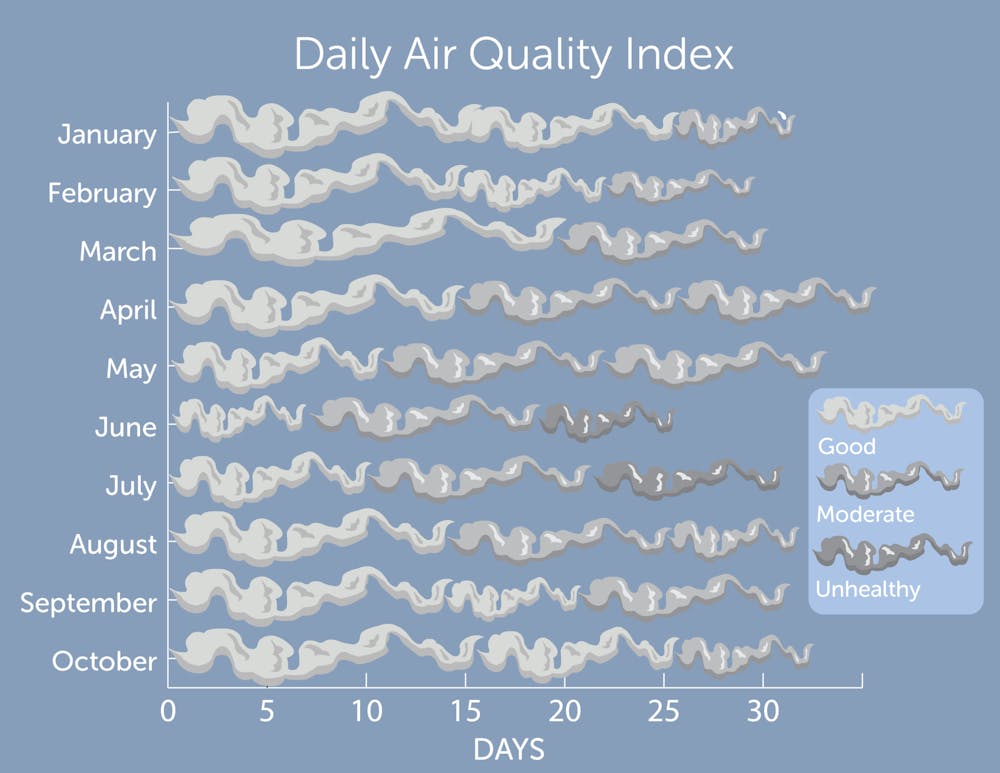From the Newsstands: This story appeared in The Eagle's December 2023 print edition. You can find the digital version here.
After smoke from unprecedented wildfires in Canada caused a spike in low air quality in D.C. this summer, American University students and faculty reflected on health impacts and potential solutions to air pollution.
Daily Air Quality Index values became increasingly unhealthy in June and July this summer, raising health concerns for residents. There were four days with very unhealthy air quality in June, with the highest AQI value at 198 on June 8.
Brooke Viner, a junior in the College of Arts and Sciences, has had moderate to severe asthma her whole life. She’s noticed ups and downs over the years, but she said that this summer in the District was particularly difficult due to the intense smoke in the air.
“It was really bad for my asthma, like I truly [could not] go outside,” Viner said. “And when I did, I would have to reach for my inhaler like a couple times a day, whereas in summer it’s usually not that bad.” She described the experience as terrifying, recounting how she would attempt to take a deep breath in the thick air, only for her chest to stop rising and falling halfway through.
Valentina Aquila, an assistant professor in the Department of Environmental Science, also noticed the change. Her research measures particulate matter — microscopic solids or liquid droplets that can cause serious health problems when inhaled.
“This summer was really exceptional from [a] pollution perspective, like we saw particulate matter concentration that we haven’t really observed in D.C.,” Aquila said. “I had never seen anything like that, but it doesn’t mean that it will not happen again.”
The presence and strength of a forest fire depends on the meteorological conditions, specifically past dryness in the region and how much fuel there is for the fire, according to Aquila. Land management to reduce fuel helps slow the spread of forest fires, but she said that it must be combined with actions to mitigate climate change.
“Climate change doesn’t cause the ignition, but climate change does cause the perfect condition for the fire to spread,” Aquila said.
Aquila also emphasized that only observing particulate matter creates an incomplete view of air pollution. Gas emissions such as ozone, carbon monoxide and nitrogen dioxide also impact air quality. Each pollutant comes from different sources and requires different research.
Michael Alonzo, an assistant professor in the Department of Environmental Science, studies forest and land cover change in mostly urban areas. Trees can be a useful tool in both mitigating heat and reducing air pollution, according to Alonzo.
Previously, Alonzo worked at Casey Trees, a local nonprofit organization focused on the District’s tree canopy. While there, he learned more about the relationships between tree traits and air quality improvement. For instance, trees can reduce pollutants through a process called dry deposition. Pollutants like ozone or particulate matter land on the leaves and typically remain there until they wash into the stormwater flow.
Now, Alonzo has brought what he learned into the classroom by getting students outside and connecting them to their local environment through data collection and modeling.
“The heart of what I do is trying to get outside and do stuff,” Alonzo said.
While there are scientific methods to reduce forest fires and other air pollutants, Viner also noted the importance of legislated regulations, such as making it less profitable for large companies to pollute the air.
“I feel pretty pessimistic, to be honest, if legislation isn't passed quickly and effectively to actually make meaningful change regarding air pollution,” Viner said. “I hope that it will change for the better soon, but you never know.”
This article was edited by Abigail Hatting, Jordan Young and Abigail Pritchard. Copy editing done by Isabelle Kravis, Sarah Clayton, Luna Jinks and Emilia Rodriguez.





